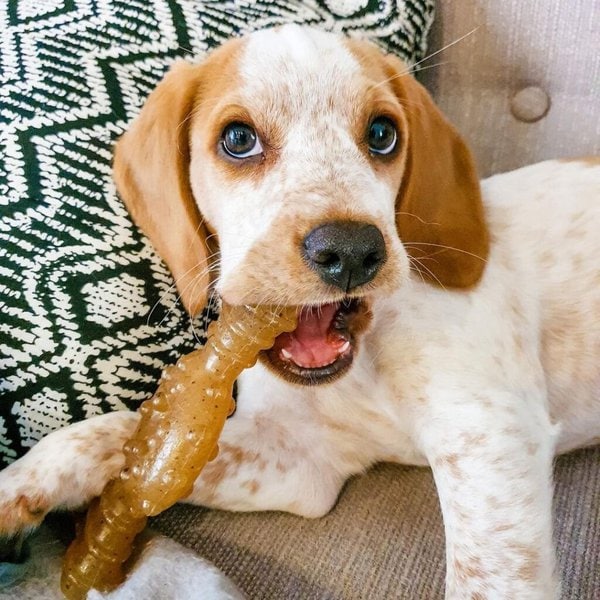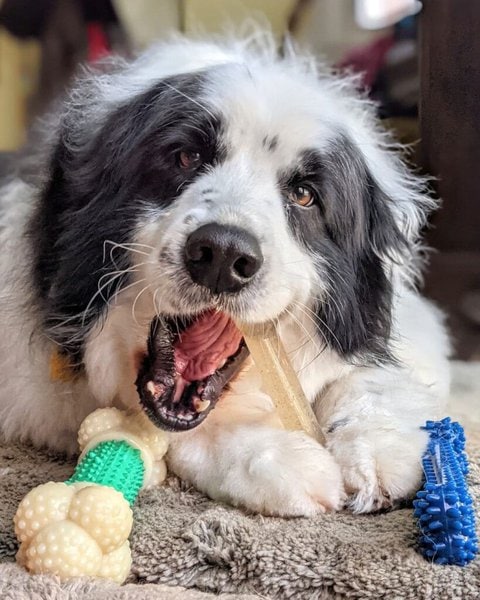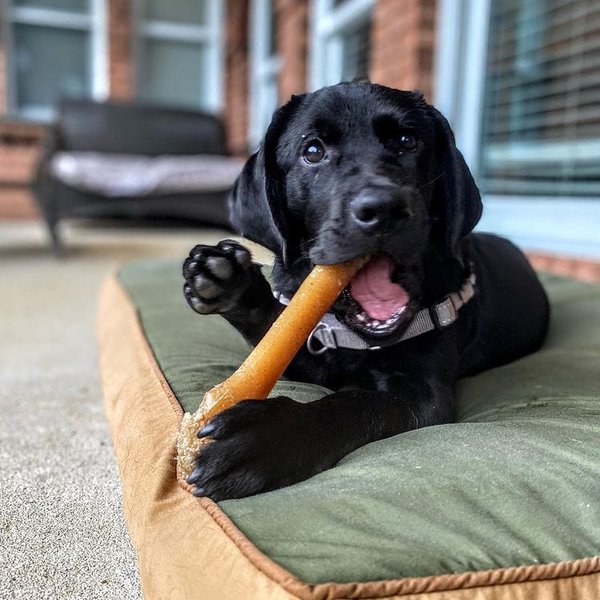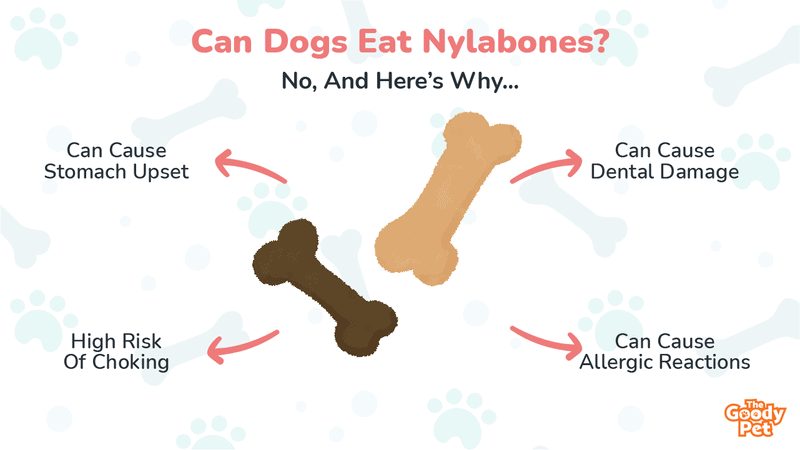Nylabones are one of the most common chew toys available for pooches, and because of the synthetic nature of these products, dog owners are often left wondering whether or not their canine buddies can eat them.
So, can dogs eat Nylabones? Both edible and non-edible Nylabones are safe for dogs to chew on, but ingestion of these chew toys usually places pooches at risk of choking, suffering from stomach upsets, and in some cases, the occurrence of allergic reactions.
Regardless of the dangers of eating non-edible Nylabones, these chew toys can be highly beneficial when properly offered to dogs. This article outlines some of the benefits that dogs stand to gain from chewing on Nylabones.
Also, as the ingestion of Nylabones can be life-threatening in some cases, we have also detailed the appropriate steps to take when your canine budding eats this chew toy. However, before we delve into all this, let’s have a look at what Nylabones are and whether or not dogs can eat them.
Can Dogs Eat Nylabones?

Dogs can safely chew on Nylabones, but consuming this chew toy is highly dangerous and can be fatal for pooches.
Nylabones is a brand of chew toys for dogs typically made of various natural or artificial materials and molded into bone-shaped objects – just as the name suggests.
Basically, Nylabone products come in two main types – edible chew Nylabones, which are digestible, and non-edible chew Nylabones, which can’t be digested.
The non-edible chew Nylabones are typically manufactured with either plastic, rubber, or nylon. And although they are typically manufactured with indigestible material, these non-edible Nylabones are generally considered safe for dogs to chew on, provided they aren’t later ingested.
Edible chew Nylabones, on the other hand, are usually produced from different proteins, starches, and flavorings.
And while they are generally considered safe for dogs to chew on and even ingest, it is important to err on the side of caution when giving these edible chew toys to pooches.
Why Should I Give My Dog Nylabones?
Nylabones, same with most other chew toys, can be beneficial to dogs if they are properly given to the pooch, and not swallowed. Some of the benefits attached with dogs chewing on Nylabones include:
- Relief from boredom and anxiety.
- Ease from the pain associated with teething in puppies.
- Provision of mental stimulation for the pooch.
- Help in curbing a dog’s destructive tendencies.
- Cleaning plaque and tartar build-up on a dog’s teeth is obtainable with Nylabone models with unique nubs on their surfaces.
What Are The Dangers Of A Dog Eating Nylabones?

Eating non-edible types of Nylabones poses a choking risk to dogs, and the flavoring typically contained in edible Nylabones can induce stomach upset and allergic reactions in pooches.
Choking
While they’re typically made of durable materials, non-edible Nylabones will wear off with continued use, and dogs with sharp teeth can bite through and cut off portions of this chew toy.
As mentioned earlier, non-edible chew Nylabones are indigestible. Suppose your dog bites off and swallows a significant portion of these chew toys; in that case, there is every likelihood of the chewed Nylabone obstructing the pooch’s throat, thereby resulting in a medical emergency.
Allergic Reactions
We’ve also stated that there are some types of Nylabones that dogs can digest, but these also pose health risks to dogs.
Edible chew Nylabones sometimes contain additional flavors of chicken, turkey, or peanut butter, and some of these ingredients are known to trigger allergic reactions and stomach upsets in dogs.
Common signs exhibited by a pooch suffering stomach upsets from eating Nylabones include vomiting, diarrhea, weakness, and a loss of appetite. And it is recommended that you seek out a vet immediately if you observe any of these symptoms.
Dental Damage
We’ve mentioned before how Nylabones can help control plaque build-up on a pooch’s teeth, but in the same vein, constantly biting on hard Nylabone chew toys can weaken and subsequently break a pooch’s teeth.
That said, dogs with otherwise healthy teeth are at a lower risk of suffering tooth breakage from chewing on Nylabones than pooches with a history of tooth fracture.
And the risk of a dog suffering teeth damage from chewing on Nylabones is as low as when the pooch is biting on other hard surfaces.
What Should I Do If My Dog Eats Nylabones?
Consult your vet for further advice if you discover that your pooch has eaten part of its Nylabone, and also take the chew toy out of the Fido’s reach to prevent further consumption.
Do Dogs Poop Out Nylabones?
Yes, dogs do poop out Nylabones, and it depends on how much they have ingested.
The first thing to do if you discover that your canine buddy has taken a bite of its Nylabone is to try and determine how much of this chew toy the pooch has bitten off.
Nylabones aren’t totally indestructible, and if your pooch has eaten just a small amount of this chew toy, no bigger than a grain of rice, then it should be able to pass through the dog’s digestive system without incident.
You may have to exercise some patience, though, as it’ll typically take between 10 to 24 hours for fragments of the Nylabone to appear in the pooch’s poop.
The problem, however, is if your canine buddy has eaten big chunks of Nylabones. And if you discover that your dog has eaten a large piece of Nylabone, then you need to see a vet immediately!

Restrict Further Access To The Chew Toy
Having your pooch continue to chew on the Nylabone while talking to the vet about possible swallowing can be counterproductive; Hence, it is important to clear out remnants and shards of Nylabone to prevent your canine buddy from ingesting more pieces of this chew toy.
Don’t Attempt To Treat At Home
While it may be tempting to induce vomiting in a dog that has swallowed Nylabones, the chew toy can get stuck while coming back up, which can be immediately life-threatening.
Consequently, you should resist the urge to induce vomiting in a pooch that has swallowed Nylabones unless the vet instructs explicitly.





